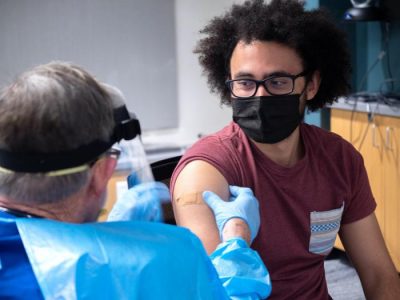Study testing how well COVID-19 vaccine prevents spread of SARS-CoV-2 among university students expands to include young adults not in college
July 6, 2021
The Prevent COVID U study, which launched in late March 2021 to evaluate SARS-CoV-2 infection and transmission among university students vaccinated with the Moderna COVID-19 Vaccine, has expanded beyond the college setting.

Student Richard Biggs gets his first dose of the Moderna vaccine. (Glenn Asakawa/University of Colorado)
The study is now enrolling young adults ages 18 through 29 years — both those who want to be vaccinated and those who choose not to receive a vaccine.
The expanded trial continues to test if, and to what degree, the Moderna COVID-19 Vaccine can prevent infection with SARS-CoV-2, limit the amount of virus in the nose and reduce transmission of the virus from vaccinated persons to their close contacts.
It is being conducted through the COVID-19 Prevention Network (CoVPN), operationally headquartered at the Fred Hutchinson Cancer Research Center, and is funded by the federal COVID-19 Response Program and the National Institute of Allergy and Infectious Diseases (NIAID), part of the National Institutes of Health (NIH).
“Importantly, the initial study goals have not changed,” said Larry Corey, MD, principal investigator of CoVPN’s operations program and one of the study leaders. “But now, with the widespread availability of COVID-19 vaccines and many colleges requiring vaccination among their students, we’re opening up the trial to enroll more people at more locations and including those who don’t intend to get vaccinated in the near future.”
The study modification to expand and include more young people — who are often asymptomatic — will help researchers more quickly and definitively determine if the vaccine works to prevent infection and spread of the virus.

Dr. Audrey Pettifor
“By participating in this study, young people are contributing to history and should be congratulated for the role they will play in helping to answer what is still a critical question to date: To what degree do people who are vaccinated shed virus and potentially infect others?” said Audrey Pettifor, PhD, professor of epidemiology at the UNC-Chapel Hill Gillings School of Global Public Health and co-principal investigator of the nationwide study.
Prevent COVID U will enroll 18,000 eligible individuals from the general population. As in the initial trial, 6,000 individuals will be randomly selected to receive the vaccine right away and another 6,000 will be randomized to follow local guidance and their preference for vaccination timing or to be vaccinated through the study after four months. Additionally, the expanded study will enroll up to 6,000 young adults who choose not to be vaccinated, which will help to ensure a large enough control group of non-vaccinated people to compare infection and transmission rates with those who are vaccinated right away at enrollment.
All participants who have not yet been vaccinated by the end of the four-month study will be offered the Moderna COVID-19 Vaccine.
“The expanded enrollment and inclusion of participants who prefer not to be vaccinated will ensure that the study successfully answers the critical questions as to vaccine effects on acquiring infection and transmitting infection to others,” said Holly Janes, PhD, a professor at Fred Hutch and one of the leaders who designed the trial.
All participants in the study will complete questionnaires via an eDiary app twice weekly, swab their nose daily for SARS-CoV-2 infection and provide periodic blood samples. They also will be asked to identify their “close contacts,” such as family members, roommates and friends, who will then be invited to take part in the trial.
To make it more convenient for people participating in the expanded trial, as many study procedures as possible will be conducted remotely and electronically. Nasal swabs can be returned via the mail or dropped off at a study site — and study participants may be compensated up to $1,032 for their time and effort.
More than 40 sites — including universities, health care centers and community organizations across the United States — will participate in the expanded study.
Individuals between the ages of 18 and 29 years old, who are unvaccinated, have not had COVID and are interested in participating in this important clinical trial may learn more or consider enrolling by visiting the Prevent Covid U study website.
Contact the UNC Gillings School of Global Public Health communications team at sphcomm@unc.edu.
